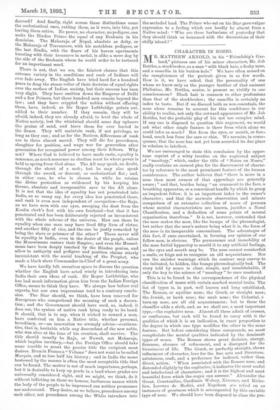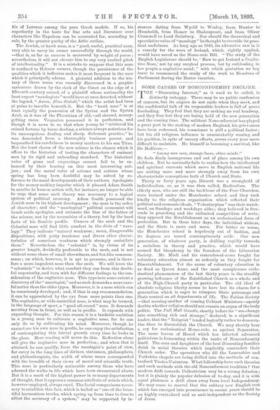CHARACTER IN NOSES.
MR. MATTHEW ARNOLD, in his "Friendship's Gar- land," pictures one of his minor characters, Mr. Job Bottles, a stockbroker, as a man "with black hair, a fleshy nose, and a camellia in his button-hole." We have often mused on the completeness of the portrait given in so few words. How is it, we have asked, that the personality of one whom we know only as the younger brother of that eminent Philistine, Mr. Bottles, senior, is present so vividly to our consciousness ? Black hair is common to other professions than that of the stockbroker; the camellia is certainly no index to taste. But if we discard both as non-essentials, the nose alone remains to account for this confidence in our ability to realise, not only the outward appearance of Mr. Job Bottles, but the probable play of his not too complex mind. If any one is disposed to question this argument, we would ask what other single feature is there from which alone we could infer as much Not from the eyes, or mouth, or fore- head, much less from the ears or chin. We surmise, in conse- quence, that the nose has not yet been accorded its due place in relation to intellect.
We are encouraged to state this conclusion by the oppor- tune reprint of a witty treatise on the neglected subject of " nasology," which, under the title of "Notes on Noses," really contains an earnest plea for the discernment of charac- ter by reference to the most prominent feature of the human countenance. The author believes that "there is more in a nose than moat owners of that appendage are generally aware ; " and that, besides being "an ornament to the face, a breathing apparatus, or a convenient handle by which to grasp an impudent fellow, it is an important index to the owner's character; and that the accurate observation and minute comparison of an extensive collection of noses of persons whose mental characteristics are known, justifies a Nasal Classification, and a deduction of some points of mental organisation therefrom." It is not, however, contended that the nose makes the man, like the bumps of the phrenologist, but rather that the man's nature being what it is, the form of the nose is its inseparable concomitant. The advantages of this fact, if once ascertained, in forming our opinion of our fellow-men, is obvious. The permanence and immobility of the nose forbid hypocrisy to mould it to any artificial feelings, as the eyes and mouth may be. The nose cannot counterfeit a. smile, or feign not to recognise an old acquaintance. Nor can the sinister warnings which its contour may convey to the initiated, be hidden, like bumps phrenologically bad. The story told by noses is clear, simple, and unmistakable, if only the key to the science of " nasology " be once mastered.
This is to be found in the correspondence of the physical classification of noses with certain marked mental traits. The list of types is, in part, well known and long established. The Roman, or aquiline nose ; the Greek, or straight nose ; the Jewish, or hawk nose; the snub nose ; the Celestial, o turn-up nose, are all old acquaintances ; but to these the classifier adds a sixth, and, as we shall see, a most important type,—the cogitative nose. Almost all these admit of crosses, or confusions, but each will be found to carry with it the qualities of which it is an indication, in exact proportion to the degree in which one type modifies the other in the same feature. Bat before considering these compounds, we must recapitulate the mental qualities indicated by the dominant types of noses. The Roman shows great decision, energy, firmness, absence of refinement, and a disregard for the bienseancec of life. The Greek, or perfectly straight, shows refinement of character, love for the fine arts and literature, astuteness, craft, and a preference for indirect, rather than direct, action. "When associated with the Roman nose, and distended slightly by the cogitative, it indicates the most useful and intellectual of characters; and it is the highest and most beautiful form which the organ can assume." Alexander the Great, Constantine, Cardinals Wolsey, Ximenes, and Riche- lieu, Lorenzo de Medici, and Napoleon are relied on as instances of greatness which is accompanied by this enviable type of nose. We should have been disposed to class the pro-
file of Lorenzo among the pure Greek models. If so, his superiority in the taste for fine arts and literature over characters like Napoleon can be accounted for, according to rule, by the greater purity of the Attic outline.
The Jewish, or hawk nose, is a "good, useful, practical nose, very able to carry its owner successfully through the world, —that is, so far as success is measured by weight of purse ; nevertheless, it will not elevate him to any very exalted pitch of intellectuality." It is a mistake to suppose that this nose is confined to Hebrew owners, though the persistence of the qualities which it indicates makes it most frequent in the race which it principally adorns. A pictorial addition to the his- tory of these noses was recently discovered in a graphic caricature drawn by the clerk of the Court on the edge of a fifteenth-century record, of a plaintiff whose nationality the least expert " nasologists " would have at once detected, without the legend, "Aaron, filius which the artist had been at pains to inscribe beneath it. But the "hawk nose" is at least equally the possession of the Syrian and the Syrian Arab, as it was of the Pluenician of old,—all shrewd, money. getting races. Vespasian possessed it in perfection, and though it is news to us that when young be "retrieved his ruined fortune by horse-dealing, a science always notorious for its unscrupulous dealing and sharp, dishonest practice," he was descended from a thoroughly business parent, and bequeathed his carefulness in money matters to his son Titus. Not the least charm of the new science is the chance which it offers to the historian of testing the characters of eminent men by its rigid and unbending standard. The historical value of gems and engravings cannot fail to be en- hanced by their bearing on this most interesting sub- ject; and the moral value of axioms and actions whose spring has long been doubtful may be solved by re- ference to the nasal developments of their authors. Apologists for the money-making impulse which it pleased Adam Smith to ascribe to human action will, for instance, no longer be able to urge that some such theory was necessary to a logical system of political economy. Adam Smith possessed the Jewish nose in its highest development ; the nose is the reflex of character ; and the " nasological " political economist will brush aside apologies, and estimate the bias of the father of the science, not by the necessities of a theory, but by the hard facts of his Semitic profile. Owners of the snub and the Celestial nose will find little comfort in the dicta of " naso- logy." They indicate "natural weakness ; mean, disagreeable dispositions, with petty insolence and divers other charac- teristics of conscious weakness which strongly assimilate them." Nevertheless, the " celestial " is, by virtue of its greater length, decidedly preferable to the snub, and is not without some share of small shrewdness, and fox-like common- sense ; on which, however, it is apt to presume, and is there- fore a more impudent nose than the snub. We will leave the " celestials" to derive what comfort they can from this doubt- ful superiority, and turn with far different feelings to the con- sideration of the cogitative nose. This type is to some extent a discovery of the" nasologiet," and as such demands a more care- ful notice than the older types. Moreover, it is a nose which can be consciously developed; and, if that is any recommendation, it can be appreciated by the eye from more points than one. The cogitative, or wide-nostrilled nose, is what may be termed, in the language of sport, a "good all-round" nose. It demands scrutiny from in front, as well as in profile. It expands with expanding thought. For this reason it is a laudable ambition in a young man to cultivate a cogitative nose, for he can only do so by cultivating his mind. Moreover, though he cannot see his own nose in profile, he can enjoy the satisfaction of contemplating this lateral growth every time he looks in the glass. Mere reading will never do this. Reflection alone will give the cogitative nose in perfection ; and when that is attained, he can qualify, from the nasologist's point of view, for entry in the long lines of divines, statesmen, philosophers, and philanthropists, the width of whose noses corresponded with the breadth of their views of moral and scientific truth. This nose is particularly noticeable among those who have adorned the walks in life which have been enumerated above. But it is a mark of the highest power in so many departments of thought, that it appears a common attribute of minds which, however employed, always excel. The facial comparisons neces- sary to establish this fact, which is hailed as "one of the beau- tiful harmonious truths, which spring up from time to time to attest the accuracy of a system," may be supported by in- stances dating from Wyclif to Wesley, from Hunter to, Humboldt, from Homer to Shakespeare, and from Oliver Cromwell to Lord Salisbury. Nor should the theoretical and speculative value of "nasology" be thought to override its prac- tical usefulness. As long ago as 1843, its advocates saw in it a remedy for the woes of Ireland, which, rightly applied, would have saved us the Home-rule Bill. "The study of the English Legislature should be, How to get Ireland a Cogita- tive Nose,' not by any surgical process, but by cultivating in her people a cogitative mind;" with which quotation we beg leave to recommend the study of the work to Members of Parliament during the Easter vacation.



































 Previous page
Previous page